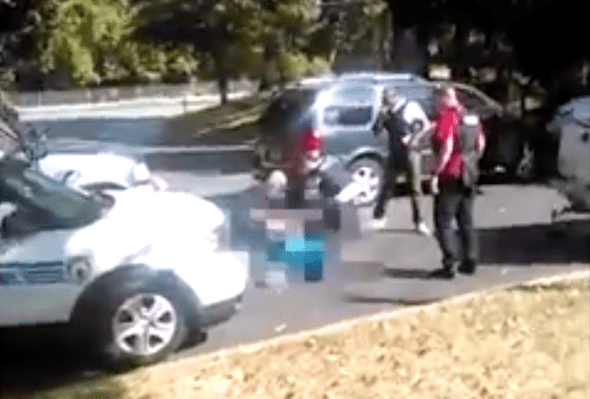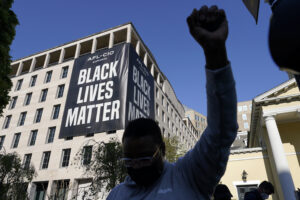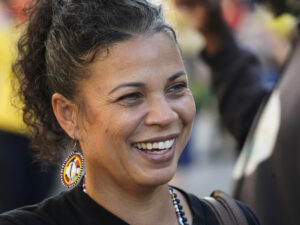Photo of the Week: The Police Killing of Keith Scott
“He better not be fucking dead!” shouts Rakeyia Scott, standing a short distance away from where police officers surround her dying husband.
Police killed Keith Scott in Charlotte, N.C., during a confrontation that occurred Tuesday when officers mistook him for a man they were seeking to arrest. (Keith Scott Family / Curry Law Firm)
“He better not be fucking dead!” shouts Rakeyia Scott, standing a short distance away from where police officers lean over her dying husband.
The footage, taken by Scott during the final moments of Keith Scott’s life, went public two days after he was shot and killed by police officers in Charlotte, N.C. The officers say they mistook the 43-year-old for another suspect and claim Scott had a gun, which his family denies.
“He sits in the shade, reads his book and waits on his kid to get off the bus,” Scott’s sister told The Guardian. “He didn’t have no gun, he wasn’t messing with nobody.” In the video, Rakeyia tells the officers her husband has a brain injury.
The officers killed Scott two days after police in Tulsa, Okla., killed 40-year-old Terence Crutcher. Crutcher was unarmed and walking toward his car when officers shot him with a stun gun and then a fatal bullet. A man filming the scene from a police helicopter says in a clip of the incident: “Time for a Taser. … That looks like a bad dude, too. Probably on something.”
Crutcher’s twin sister, Tiffany Crutcher, called for charges against the officers. “You all wanna know who that big, bad dude was?” she asked at a conference. “The big bad dude was my twin brother. That big bad dude was a father. That big bad dude was a son. That big bad dude was enrolled at Tulsa Community College, just wanting to make us proud.”
Chuck Jordan, chief of police in Tulsa, told reporters, “there was no gun on the suspect or in the suspect’s vehicle.” Authorities charged Betty Shelby, the officer who shot Crutcher, with first-degree manslaughter but kept her in custody for just 20 minutes before releasing her on a $50,000 bond. If convicted, Shelby faces between four years and life in prison.
Kerr Putney, chief of the Charlotte-Mecklenburg Police Department and himself black, said at a news conference that video footage held by police showed Scott holding a gun and not a book, as Scott’s family claimed. The department agreed to show the video to Scott’s family but refused to release it publicly.
In a moving response to these killings and others, Seattle-based writer Ijeoma Oluo observed: “Those who are served by the police may be more likely to believe them over Scott’s family. …
“But those of us who are not served by the police remember that the gun reportedly found on Che Taylor was traced to a sheriff’s deputy. We remember that officer Michael Slager was caught planting a weapon on the body of Walter Scott after he was shot in the back while running away. We remember that Samuel DuBose was politely interacting with police during a traffic stop when officer Ray Tensing shot him in the head and then immediately claimed to his superiors that DuBose had tried to run him down. We remember that officers claimed that 19-year-old Laquan McDonald was threatening them with a knife, until video revealed that he was running away from officers when he was shot 16 times.”
“We … live in a world where we can’t call the police when we need them,” Oluo added, “because we know that there is a good chance that we or our loved ones will be killed for it.”
Protesters flooded the streets of Charlotte on the nights following Scott’s killing. North Carolina Gov. Pat McCrory responded by declaring a state of emergency and calling for help from the National Guard and the highway patrol. A demonstrator named Justin Carr was injured during the protests and subsequently died. City authorities claimed he was killed in a “civilian-on-civilian” shooting at an intersection.
Witnesses claim otherwise. Eddie Thomas, an attorney and public defender who was at the demonstration to observe interactions between police and the public, said, “There was no issue between protesters.” Present when Carr was fatally injured, he said he thought that the protester fell and hit his head on the sidewalk after being shot with what police call a “less lethal” round. (“Less lethal” weapons still have the capacity to kill but differ from lethal weapons in mass of the round, velocity and other ways.) Police later arrested a suspect in Carr’s death, Rayquan Borum, 21, a North Carolinian who served a short prison sentence for larceny and breaking and entering before being released in 2012.
Update: Charlotte police released dashcam and body-cam footage of the killing of Scott.
Independent journalism is under threat and overshadowed by heavily funded mainstream media.
You can help level the playing field. Become a member.
Your tax-deductible contribution keeps us digging beneath the headlines to give you thought-provoking, investigative reporting and analysis that unearths what's really happening- without compromise.
Give today to support our courageous, independent journalists.






You need to be a supporter to comment.
There are currently no responses to this article.
Be the first to respond.